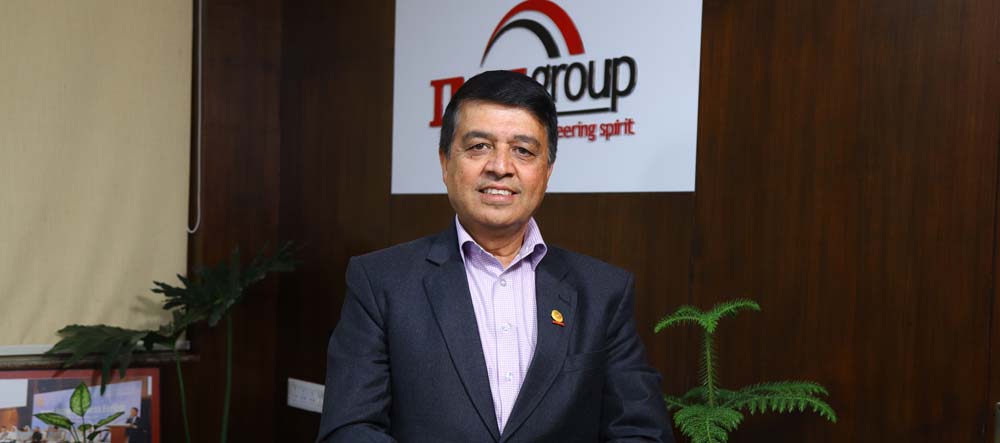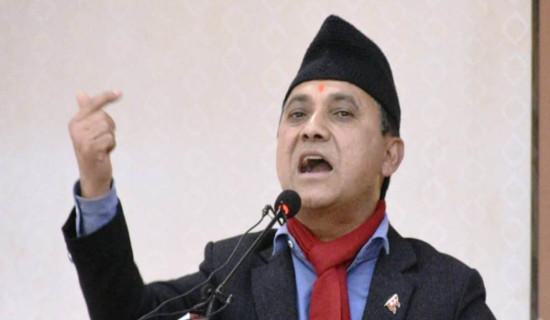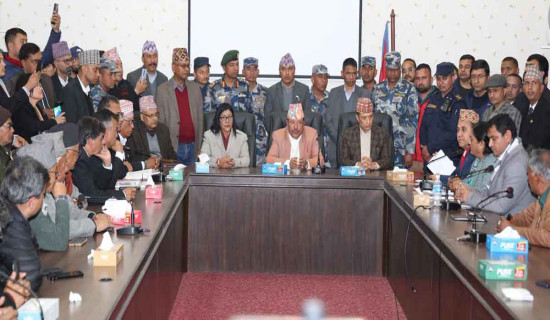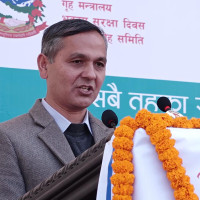- Saturday, 17 January 2026
Ordinance will spur private sector growth
Chairman of the IME Group, Chandra Prasad Dhakal, is the President of the FNCCI - the largest private sector organisation in the country. As an entrepreneur with extensive involvement in various business sectors including remittance, manufacturing, travel and tourism, hospitality, banking and finance, infrastructure and automobile, he has a deep understanding of the economy and business environment in Nepal. Modnath Dhakal of The Rising Nepal and Bishwas Regmi of The Gorkhapatra daily talked to him about the impacts of the ordinance recently issued by the government to facilitate business and investment in the country, the status of the private sector and obstacles to business. Excerpts:
Amidst the sustained slowdown in the economy, the government recently introduced amendments to provisions related to the economic sector through an ordinance, which the private sector welcomed. But is the private sector genuinely satisfied with the move from the government?
The issues amended through the ordinance were long-awaited by the private sector. The revision in the Black Marketing Act is expected not only to encourage Nepal’s private sector but also to attract foreign investors by ensuring a suitable return on investments. In terms of revenue leakage, the revised laws have provided an opportunity for those willing to pay their taxes. The earlier complexity of dissolving a company that was not operational has been simplified through these amendments as well, which are highly practical. The amendment to the Arbitration Act has broadened the scope for resolving economic disputes through mediation. Additionally, provisions have been added to facilitate IT businesses in seeking opportunities abroad, which is a significant achievement. This particularly has been one of the reforms most demanded from the young IT entrepreneurs as well as other concerned stakeholders. The changes made through the ordinance spurs private sector growth.
Likewise, the government has also removed the procedural hurdles by eliminating the compulsion of requiring Cabinet decisions even for minor tasks, delegating such responsibilities to the concerned ministries and secretaries. This change will save considerable time for both the bureaucracy and entrepreneurs. Meanwhile, the Prime Minister has expressed his commitment to address the hierarchy of protocol to boost the morale of the private sector. Financial incentives may not always be necessary to encourage the private sector, but such initiatives are equally motivating as they help to promote its good image. Just to take a recent example, during US President Donald Trump’s oath-taking ceremony, the first row was occupied by his family, the second by the representatives from the private sector and the third was assigned to the Cabinet ministers. This indicates that there are many ways to encourage the private sector.
So, the amendments have addressed several legal hurdles that were constantly put forth by the private sector businesses. However, the government must now focus on implementing these changes promptly through procedures and standards. We are happy that the demands raised by the private sector, particularly the FNCCI, have been incorporated into the ordinance, which has encouraged us.
What role did the private sector and FNCCI play in these reforms?
Twenty months ago, when I assumed office as the FNCCI President, on behalf of the private sector, I had committed to initiating five major reforms for the economy. At that time, the economy was shrinking due to the impacts of COVID-19 and certain policy constraints. To uplift the economy from that situation and create a conducive investment environment in Nepal, the FNCCI undertook integrated efforts through the private sector and worked to unite political parties on economic issues, with an aim to minimising opposition in terms of economic and development aspects.
Previously, there was a tendency for the government to accuse the private sector and for the private sector to blame the government for inaction. Recognising that such an approach would not lead the economy anywhere, I publicly committed to making the private sector a collaborative partner with the government. We had urged the government to prioritise extensive reforms in traditional laws that hinder investment and ensure policy stability to uplift the private sector's morale. It resulted in bringing political leaders, including the Prime Minister, former prime ministers, and leaders of all major parties, together on a single platform to align their perspectives on economic issues. This led to amendments to several laws, including those announced on the very day of the investment summit’s inauguration.

During our informal conversations with foreign investors from the Middle East, they frequently highlighted the need for bilateral investment agreements. I took the initiative to convince the government to address this requirement, and we now have it. To uplift the private sector's confidence, FNCCI held an executive committee meeting in Dhorpatan, Baglung, where we decided to establish the Nepal Development Public Limited company with a paid-up capital of Rs. 10 billion. This company is already operational, demonstrating ample investment opportunities in Nepal and positively impacting the morale of the private sector. We also worked to unite various private sector organisations on economic issues during that period.
Have the legal reforms sought by the private sector been fully addressed?
To a large extent, many legal issues have been resolved. But the critical concern now is how these laws will be implemented. The government must work to formulate corresponding policies, procedures, and standards to ensure the effective implementation of the reforms announced. Without it, the business sector wouldn't be benefitted and the economy wouldn't be benefitted much from the steps announced to implement reform.
Despite past initiatives to amend laws, hold investment summits, and create a better investment environment, why has the economy not seen the expected impact? Are structural issues to be blamed?
Regarding the investment summits, they were organised more as events rather than strategic moves to attract investors and investments. The private sector was only included at the last minute, making it challenging to evaluate whether past commitments were fulfilled, or whether work was conducted down the line. But I would like to take a note that the government’s spirit of making timely legal amendments is commendable. The focus now should be on translating that spirit into rules, procedures, and implementation. This will send a clear message to the private sector and foreign investors that Nepal is a viable investment destination. The economic model we envision is one where infrastructure development is also led by the private sector. Unfortunately, there is still some reluctance to view the private sector positively. However, looking globally, economies led by the private sector have seen remarkable development.
I see immense opportunities in Nepal. For example, one-third of the world’s Buddhist population aspires to visit Nepal. This alone highlights the transformative potential of tourism for our economy. Every sector in Nepal is ripe with investment opportunities. The government simply needs to create the necessary laws, policies, and basic infrastructure to facilitate these opportunities. With this foundation, the private sector will increase investments, delivering on time, on budget, and with quality. Infrastructure development benefits the entire economy, not just the businesses. Unfortunately, negative narratives on social media often overshadow the country’s potential and opportunities. In this regard, there is a need for mindset change as well.
Despite strong economic indicators like low interest rates and adequate foreign reserves, credit expansion has slowed. Does this suggest that even favourable indicators cannot drive the economy?
This slowdown has resulted from poor decisions made at the wrong time. In the past, fearmongering about a crisis similar to Sri Lanka in the post-COVID scenario led the government to impose import restrictions on over a dozen goods. That unnecessary decision was driven by baseless fears which resulted in extra-cautious moves by the government thus significantly reduced the demand of goods and services in the market. Businesses relying on bank loans were forced to operate at minimal capacity. Subsequently, the whole economy was weakened.
This situation taught us a lesson that liquidity, low interest rates, and foreign reserves alone are insufficient to sustain the economy. All economic parameters must be aligned. The government needs to increase spending, especially the capital budget, and boost the private sector’s confidence to stimulate demand. Facilitating the private sector is crucial—not just for their benefit but for the economy as a whole.
Meanwhile, the belief that supporting the private sector is essential to reviving the economy is gaining traction, of late. This positive approach and taking the private sector as the partner in national development will help the economy recover swiftly.
The private sector has also been voicing against the challenges faced by private sector-led projects. How critical is coordination among federal, provincial and local governments?
This is an important issue that should be addressed promptly. Coordination among all levels of government is crucial. We have examples where projects were stalled for years simply because of delays in obtaining permission to cut a tree. Minor disputes have left significant investments stranded. Such instances demand effective collaboration among governments. Lack of proper collaboration among them creates policy and execution confusion seriously impacting the private sector projects.
Once a project receives approval from one government, other governments must facilitate its progress. While federalism is still in its early stages in Nepal, development and economic issues require consensus and coordination among all levels of government. Only under such circumstances can an investment-friendly environment be created where private sector would feel encouraged to make an investment.
You have completed 20 months as the president of the FNCCI. What achievements do you think you could make during your tenure?
During my early days as the president of the FNCCI, there were efforts to bring the private sector under the jurisdiction of the Commission for the Investigation of Abuse of Authority (CIAA), an anti-graft body. However, the private sector operates differently from the government-adopted modality, and such oversight could have discouraged accountability, delayed work, and harmed the morale of entrepreneurs. The FNCCI opposed this move and through persistent efforts, we ensured that the private sector remained outside such provisions.
Similarly, we resolved a long-standing dispute regarding dedicated and trunk line payments by proposing a fair solution as recommended by an independent probe commission. We also ensured that disconnected lines in industries were reconnected through government intervention. High government officials including the chief secretary played a positive role in resolving the long-standing issue.
During this period, the FNCCI organised international investment summits in China, Qatar, and Dubai, presenting bilateral investment agreements and laying new foundations for investment. I took the initiative for investment agreement which has created bilateral investment opportunities. Meanwhile, statute of the FNCCI was amended, introducing direct elections, ensuring women’s leadership, and addressing the tenure of executive committees. We also plan to organise an economic summit in March, with participation from diplomats, investors, and representatives from the FNCCI's counterpart organisations from over 90 countries.
The IME Group has significantly expanded its business in banking, digital service, tourism and infrastructure. What are the Group’s upcoming plans as a leading business entity in Nepal?
Our operations focus on three principles: benefiting the public, supporting the government, and substituting imports. We are currently working on tourism infrastructure in all seven provinces to realise Nepal’s tourism potential, attract more tourist and extend their stay. Extending the average tourist stay from 12 days to 20 days could significantly impact the economy by generating employment and boosting transport, hospitality and travel sectors.
We recently began producing A4-sized paper domestically and will soon start producing cement boards. These initiatives aim to substitute imports and promote local products. In hydropower, several projects are underway while we are also exploring opportunities in Information Technology. Currently, 500–600 IT engineers work under the IME Group and we aim to transform IT potential into opportunities. IME Group prioritises turning Nepal’s potential into tangible opportunities, directly benefiting the local population.
















